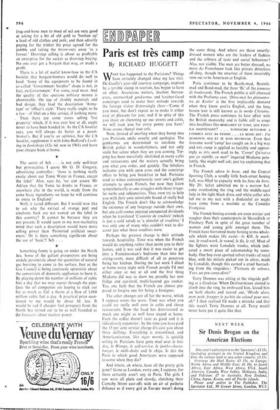Paris est tres camp MDC)8PEN
By RICHARD HUGGETT
Now, instead of snarling when they bump into you Parisians smile sweetly and apologise. The gendarmes are determined to outshine the British police in wonderfulness, and not only smile but salute when they see you coming. Tip- ping has been mercifully abolished in many cafés and restaurants and the waiters actually bring you what you order, and quickly. The hOteliers welcome you with open arms and the concierge offers to bring you breakfast in bed. Parisians used to wince contemptuously over one's gallant attempts to speak French, but now they listen sympathetically as one struggles with those irregu- lar verbs and subjunctives. They even try to help you with their own inimitable brand of really bad English. The French don't like to acknowledge the existence of any language outside their own, but one café-owner enjoyed unexpected dividends when he translated `L'assiette de crudites' (which is just a cold salad) as 'a plateful of crudities.' I was only one of many who couldn't wait to dis- cover just what these crudities were.
Perhaps the greatest change is their attitude towards hospitality. Time was when the French would do anything rather than invite you to their homes, and it was said that it was easier to get into a Frenchwoman's bedroom than into her sitting-room, most difficult of all to penetrate being her kitchen. During the last week I dined at home every night with French people I'd met either once or not at all and the first thing Madame did was to show me proudly her new fridge and eye-level, multi-layered gas cooker. Yes, one feels that the French are almost pre- pared to forgive one for being a foreigner.
The other changes are all for the worse, which I suppose evens the score. Time was when you could eat really well even in cafés and cheap restaurants. Now the food has deteriorated so much one might as well have stayed at home. Even the coffee doesn't taste as good and it is ridiculously expensive: by the time you have paid the 15 per cent service charge it's cost you about three shillings. Everything is streamlined, and Americanisation, like rigor mortis, is quickly setting in. Parisians have gone mad over le hot- dog, le Wimpy, le self-service, le jumbo-cheese- burger, le milk-shake and le chips. Is this the Paris to which good Americans were supposed to come when they die?
And where, oh where, have all the pretty girls gone? Gone to London, every one, I suppose, for there certainly aren't any in Paris. The girls I saw were all plain and dowdy, clutching their Carnaby Street cast-offs with an air of pathetic defiance as if every girl in Europe wasn't doing the same thing. And where are those smartly- dressed women who are the leaders of fashion and the arbiters of taste and social behaviour? Alas, not visible. The men are better dressed; no more do Frenchmen look like private detectives off-duty, though the smartest of them invariably turn out to be American or English.
Paris continues to be Beatle-mad, Beatnik- mad and Bond-mad, the three 'Bs' of the jeunesse de boulevards. The French public is still obsessed with the Profumo case. `Dites-moi les plaisanter- ies de Keeler' is the first implacable demand when they know you're English, and the long brown hair is still known as la mode Christine. The French press continues its love affair with the British monarchy and is liable still to erupt into headlines like MARGARET ET TONY, QUE FONT-
MAINTENANT? . . . TOVVNSEND RETOURNE A LONDRES AVEC SA FEMME . . . LA REINE DIT:
QUARANTE ANS ET JE SUIS HEUREUSE. Even that tiresome word 'camp' has caught on in a big way and tres camp is applied as lavishly and approv- ingly as fres snob used to be. 'Camp? Qu'est-ce que ça signifie, ce mot?' inquired Madame petu- lantly. She might well ask; just try explaining that in French.
The French adore le boxe, and the Central Sporting Club, a scruffy little back-street boxing hall, was filled to capacity with les fans du boxe. My 2fr. ticket admitted me to a narrow bal- cony overlooking the ring and the middle-aged lady in the tight black dress and white collar who led me to my seat with a disdainful air might have come from a matinee at the Comedic Francaise.
The French boxing crowds are even noisier and rougher than their counterparts in Shoreditch or Finsbury Park in spite of the great number of women and young girls amongst them. The French have borrowed many boxing terms whole- sale which makes life easier—le KO, le work- out, le road-work, le round, le fix, le ref. Most of the fighters wore Lonsdale trunks, which indi- cated a smart piece of salesmanship by some- body. One boy even sported velvet trunks of royal blue, with his initials picked out in silver, made by Lonsdale, though this earned a cruel barrack- ing from the ringsiders : Rlottants de velours, Yves, un peu camp alors?'
Terry Downes was sitting at the ringside puff- ing at a Gauloise. When Desfourneaux started to climb into the ring, he embraced him, kissed him on both cheeks and roared out, `Merde alors, mon petit, frappez le pschitt du salaud pour moi, eh?' I then realised I'd made a mistake and that this wasn't Terry Downes at all. Terry would never have put it quite like that.


































 Previous page
Previous page